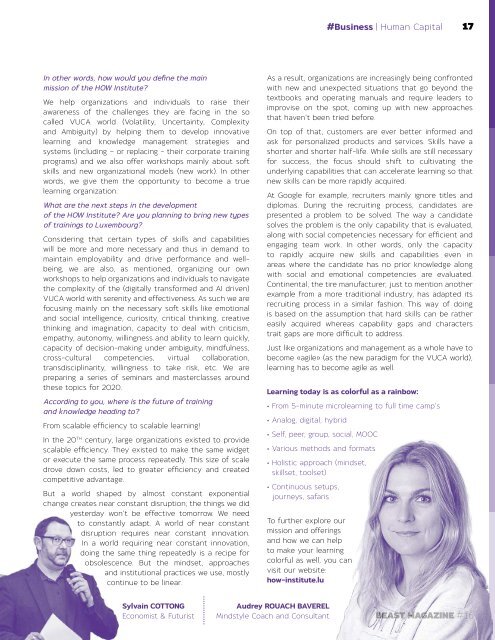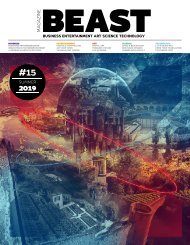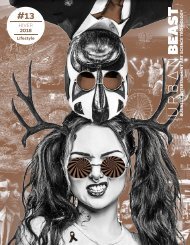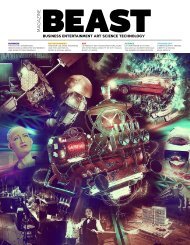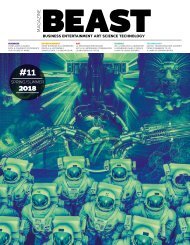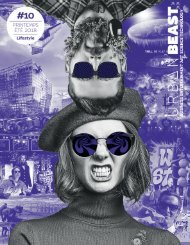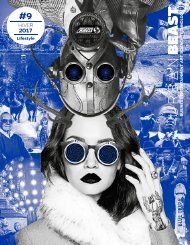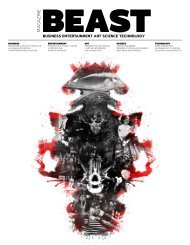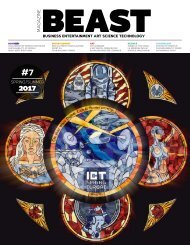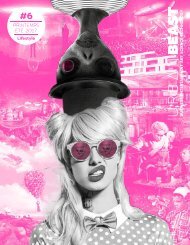Magazine BEAST #16 2019
You also want an ePaper? Increase the reach of your titles
YUMPU automatically turns print PDFs into web optimized ePapers that Google loves.
#Business | Human Capital<br />
17<br />
In other words, how would you define the main<br />
mission of the HOW Institute?<br />
We help organizations and individuals to raise their<br />
awareness of the challenges they are facing in the so<br />
called VUCA world (Volatility, Uncertainty, Complexity<br />
and Ambiguity) by helping them to develop innovative<br />
learning and knowledge management strategies and<br />
systems (including – or replacing - their corporate training<br />
programs) and we also offer workshops mainly about soft<br />
skills and new organizational models (new work). In other<br />
words, we give them the opportunity to become a true<br />
learning organization.<br />
What are the next steps in the development<br />
of the HOW Institute? Are you planning to bring new types<br />
of trainings to Luxembourg?<br />
Considering that certain types of skills and capabilities<br />
will be more and more necessary and thus in demand to<br />
maintain employability and drive performance and wellbeing,<br />
we are also, as mentioned, organizing our own<br />
workshops to help organizations and individuals to navigate<br />
the complexity of the (digitally transformed and AI driven)<br />
VUCA world with serenity and effectiveness. As such we are<br />
focusing mainly on the necessary soft skills like emotional<br />
and social intelligence, curiosity, critical thinking, creative<br />
thinking and imagination, capacity to deal with criticism,<br />
empathy, autonomy, willingness and ability to learn quickly,<br />
capacity of decision-making under ambiguity, mindfulness,<br />
cross-cultural competencies, virtual collaboration,<br />
transdisciplinarity, willingness to take risk, etc. We are<br />
preparing a series of seminars and masterclasses around<br />
these topics for 2020.<br />
According to you, where is the future of training<br />
and knowledge heading to?<br />
From scalable efficiency to scalable learning!<br />
In the 20 TH century, large organizations existed to provide<br />
scalable efficiency. They existed to make the same widget<br />
or execute the same process repeatedly. This size of scale<br />
drove down costs, led to greater efficiency and created<br />
competitive advantage.<br />
But a world shaped by almost constant exponential<br />
change creates near constant disruption; the things we did<br />
yesterday won’t be effective tomorrow. We need<br />
to constantly adapt. A world of near constant<br />
disruption requires near constant innovation.<br />
In a world requiring near constant innovation,<br />
doing the same thing repeatedly is a recipe for<br />
obsolescence. But the mindset, approaches<br />
and institutional practices we use, mostly<br />
continue to be linear.<br />
As a result, organizations are increasingly being confronted<br />
with new and unexpected situations that go beyond the<br />
textbooks and operating manuals and require leaders to<br />
improvise on the spot, coming up with new approaches<br />
that haven’t been tried before.<br />
On top of that, customers are ever better informed and<br />
ask for personalized products and services. Skills have a<br />
shorter and shorter half-life. While skills are still necessary<br />
for success, the focus should shift to cultivating the<br />
underlying capabilities that can accelerate learning so that<br />
new skills can be more rapidly acquired.<br />
At Google for example, recruiters mainly ignore titles and<br />
diplomas. During the recruiting process, candidates are<br />
presented a problem to be solved. The way a candidate<br />
solves the problem is the only capability that is evaluated,<br />
along with social competencies necessary for efficient and<br />
engaging team work. In other words, only the capacity<br />
to rapidly acquire new skills and capabilities even in<br />
areas where the candidate has no prior knowledge along<br />
with social and emotional competencies are evaluated.<br />
Continental, the tire manufacturer, just to mention another<br />
example from a more traditional industry, has adapted its<br />
recruiting process in a similar fashion. This way of doing<br />
is based on the assumption that hard skills can be rather<br />
easily acquired whereas capability gaps and characters<br />
trait gaps are more difficult to address.<br />
Just like organizations and management as a whole have to<br />
become «agile» (as the new paradigm for the VUCA world),<br />
learning has to become agile as well.<br />
Learning today is as colorful as a rainbow:<br />
• From 5-minute microlearning to full time camp’s<br />
• Analog, digital, hybrid<br />
• Self, peer, group, social, MOOC<br />
• Various methods and formats<br />
• Holistic approach (mindset,<br />
skillset, toolset)<br />
• Continuous setups,<br />
journeys, safaris<br />
To further explore our<br />
mission and offerings<br />
and how we can help<br />
to make your learning<br />
colorful as well, you can<br />
visit our website:<br />
how-institute.lu<br />
Sylvain COTTONG<br />
Audrey ROUACH BAVEREL<br />
Economist & Futurist Mindstyle Coach and Consultant<br />
<strong>BEAST</strong> MAGAZINE <strong>#16</strong>


